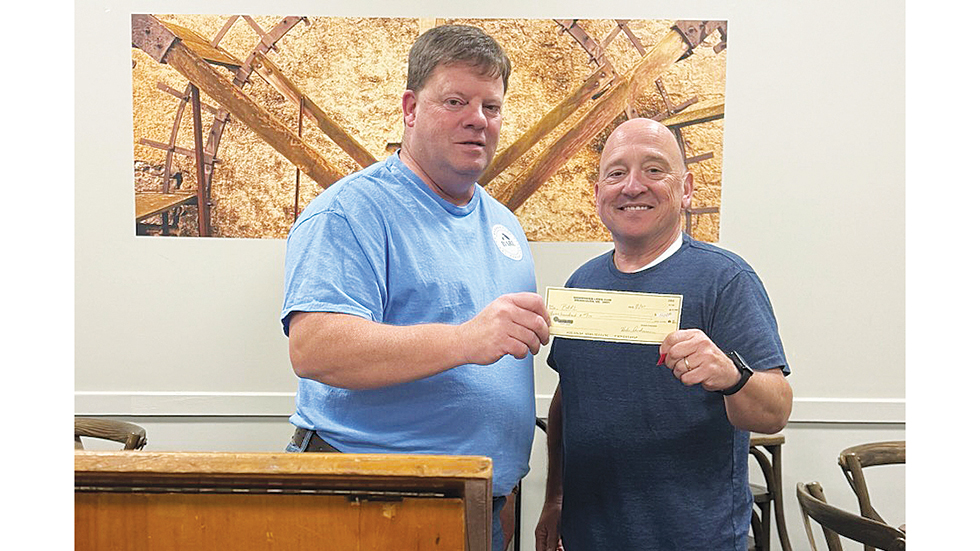Mississippi’s new alligator man provides program update
Published 5:20 pm Wednesday, September 18, 2024

- MDWFP Executive Director Lynn Posey listens to Alligator Program coordinator Andrew Arnett give a presentation on the program. (Hunter Cloud | The Daily Leader)
JACKSON — Alligator program coordinator Andrew Arnett made his first program update presentation to the Mississippi Department of Wildlife, Fisheries and Parks Commission Wednesday. The presentation came during an educational session as his co-workers reassured him he would do fine.
He said the first part of the update was about the 2024 public waters alligator season. The season was open for 10 days from Aug. 30 to Sept. 9, 2024 on public waters. In total, 6,576 people applied for alligator permits and 981 hunters were drawn.
Arnett said of the 981 permits drawn, only 692 permit holders actually hunted. He added that 3,536 hunters took part in the season and 785 alligators were harvested this year.
Trending
Mississippi broke a couple of records. One alligator broke the longest and heaviest female record by measuring 11 foot and ¾ of an inch beating the old record by about 10 inches. The same alligator beat the weight record by five pounds weighing in at 324 pounds, Arnett said.
“She was pretty healthy and taken on the Pascagoula River,” Arnett said. “She was likely in excess of 60 years old. It takes a female alligator a long time to get to that weight and height. The group hooked it the night before and lost it when the line broke off in a tree top. They were able to get her on the second night.”
Arnett said on Private Waters, hunters have a longer season of 24 days. He added 122 properties were permitted with 338 vouchers issued. Hunters can take two alligators per voucher which would equal 676 alligators eligible for harvest.
MDWFP offered a new private lands application online this year. Arnett said the landowners who used the online application liked it because they did not have to deal with scanning paperwork.
Research and study
Arnett said they are continuing to research and study alligator populations in Mississippi in a variety of ways. One way they are doing this is by tagging alligators in a continuation of a program launched in 2007.
Trending
“The database is crucial in keeping good records so we know when one is harvested or recaptured. We look at movement, survival and growth rates,” Arnett said. “One alligator we tagged in June was harvested this year a quarter of a mile away from where we tagged her.”
Arnett said they continue to conduct spotlight surveys on public waters to look at population trends. They then use the data to zoom back out and look at the curvature of the populations. Surveys can be influenced by water levels and the amount of personnel available.
He explained this year the surveys found numbers comparable to last year which indicates the population is stable. The alligator program also installed five cellular trail cameras on alligator nests to take a look at hatch dates in Mississippi.
Arnett said he hopes to use the data collected to better the alligator program. Of the five nests he set cameras on, two were raided by raccoons.
He also helped train law enforcement cadets on how to handle alligators. Arnett is a former law enforcement officer.
“We took eight live alligators. Those gators we took were caught off of complaints and all ranged between five to eight feet. They were trained on how to handle them,” Arnett said. “They could be working in areas where they might have a complaint about an alligator. We teach them how to restrain and tape the alligator’s mouth up.”
Future of the program
MDWFP commission chairman Scott Coopwood thanked Arnett for his presentation. Commissioner William Mounger asked Arnett if he had any thoughts about harvest and hunter involvement.
‘Harvest success needs to increase if we want to maintain a stable population. We are trying to figure out how to balance it,” Arnett said. “The problem is once you start catch and release it gets them educated. We are battling a mindset of trophy hunting. Hunters would rather eat two tags before keeping anything under nine feet. We would get into high grading with that mindset. We want an even age structure across the state. Participation wise, 200 permit holders spent the money and didn’t go out. There is a balance we have to find, I’m looking into finding that balance.”





